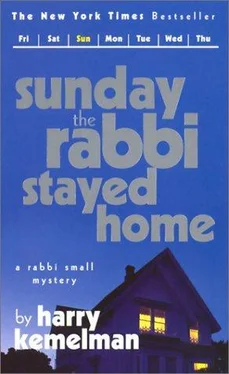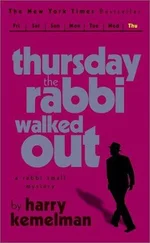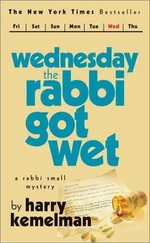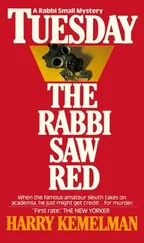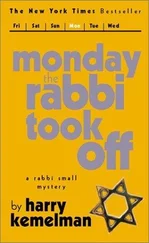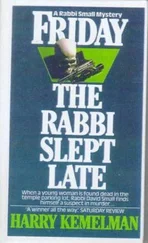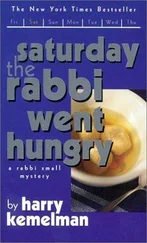Harry Kemelman - Sunday the Rabbi Stayed Home
Здесь есть возможность читать онлайн «Harry Kemelman - Sunday the Rabbi Stayed Home» весь текст электронной книги совершенно бесплатно (целиком полную версию без сокращений). В некоторых случаях можно слушать аудио, скачать через торрент в формате fb2 и присутствует краткое содержание. Город: New York, Год выпуска: 2002, ISBN: 2002, Издательство: iBooks, Жанр: Иронический детектив, на английском языке. Описание произведения, (предисловие) а так же отзывы посетителей доступны на портале библиотеки ЛибКат.
- Название:Sunday the Rabbi Stayed Home
- Автор:
- Издательство:iBooks
- Жанр:
- Год:2002
- Город:New York
- ISBN:978-0743452380
- Рейтинг книги:3 / 5. Голосов: 1
-
Избранное:Добавить в избранное
- Отзывы:
-
Ваша оценка:
- 60
- 1
- 2
- 3
- 4
- 5
Sunday the Rabbi Stayed Home: краткое содержание, описание и аннотация
Предлагаем к чтению аннотацию, описание, краткое содержание или предисловие (зависит от того, что написал сам автор книги «Sunday the Rabbi Stayed Home»). Если вы не нашли необходимую информацию о книге — напишите в комментариях, мы постараемся отыскать её.
Sunday the Rabbi Stayed Home — читать онлайн бесплатно полную книгу (весь текст) целиком
Ниже представлен текст книги, разбитый по страницам. Система сохранения места последней прочитанной страницы, позволяет с удобством читать онлайн бесплатно книгу «Sunday the Rabbi Stayed Home», без необходимости каждый раз заново искать на чём Вы остановились. Поставьте закладку, и сможете в любой момент перейти на страницу, на которой закончили чтение.
Интервал:
Закладка:
“You saying—”
“I am saying that he entered the house after Jenkins left. Since as the caretaker he must have had a key, the locked door presented no problem. He snapped on the light on entering and then went through each of the rooms. I’m suggesting that he put the plastic sheet over the boy’s head, and then, leaving the lights on as an excuse to call the police, he hurried back to his own house, where there was a phone.”
“And forgot to close the front door?”
“No. left it ajar purposely. I imagine, either on the chance of the cruising car spotting it—in which case, he would not be involved even as informer—or perhaps so as not to raise any immediate question of how the murderer had got in.”
Lanigan massaged his square chin with a big red hand as he checked back over the rabbi’s reasoning. Then he grinned. “You had me going there for a minute. Rabbi. It all sounds plausible except”—he held up an admonishing forefinger—“that he called from his own house. On the way back, he would have noticed that there was no light coming through the windows of Hillson House, because the blinds were drawn.”
The rabbi nodded. “Yes, and the phone is in a room which overlooks Hillson House. I drove by this morning and saw him at the window, phone in hand. So standing there, talking to the police, he’d certainly notice that there was no light coming from the windows of Hillson House. And the explanation is that there is where a real coincidence occurred.”
“What coincidence?”
“That while he was still inside Hillson House, or just as he left, all the lights in that part of town went out.”
“You mean the transformer blowing?”
“M-hm. That was the only coincidence.”
“How about his happening to go over there?”
“That was no coincidence. He went right after Jenkins left because Jenkins left. I mean he may have seen Jenkins leave or heard him starting up his motorcycle, right next door so to speak, so he hurried over to investigate. It looked all right; the door was locked and it was dark. But, of course, he had to make sure. He had a key and went in. Naturally, he put on the lights. Maybe he listened for a moment or called out. Then he went for a look around and found Moose. Since he wanted the body found immediately, that very night—”
“Why did it have to be that night?”
“Because if he waited a day or two, he himself would have to find the body—he was the caretaker. This way, it would be the police who would find the body, and if they came that night, they would see fresh evidence of someone having been there—cigarette butts, beer cans.”
Lanigan smiled. “Nice work, Rabbi. I’ll add Begg to my list of Jenkins, Paff, Carter, and seven assorted kids. While chewing the fat with Eban Jennings, my lieutenant, I made as good a case against each of those others. But, of course, they all have flaws. For instance, Begg couldn’t have known that Moose was in Hillson House, now could he?”
The rabbi shook his head.
“So if he had some reason for killing Moose, which you haven’t bothered to mention, by the way, how would he have known to go in there? The normal thing, if he thought someone had broken into the place, was to call the police and ask them to check.”
“I suppose because he had to go there. Before calling the police, he had to make sure that nothing had been taken.”
“Like what?”
“Like marihuana. He’d be more likely to cache it there than keep it in his own house.”
“But Mr. Begg? A pusher? Oh, that’s impossible. Rabbi.” His face showed utter incredulity. “He’s an old-time resident of the town, a crusty Yankee.”
The rabbi’s grin was derisive. “And former teacher and former selectman who couldn’t do anything wrong. It must be an outsider, a stranger.”
“All right. I suppose I deserve that.” said Lanigan, “but what I really meant is that—that he’s a cantankerous sort of man who’s always in our hair. If he were engaged in something like pot peddling, he wouldn’t be calling attention to himself.”
The rabbi shrugged off the argument. “Protective coloration. It evidently worked better than to try to be unobtrusive, especially in a small town like this. He always had the reputation of being a crank, so he went on being one when he began selling this stuff. It was safer than suddenly changing his image.”
Lanigan was silent, then he said quietly. “What made you think of him? Did you work this out by this Talmudic pil—whatever it is?”
“Pilpul? Not at all. I thought of Begg because he was the most obvious suspect. You would have seen it, too, if you weren’t conditioned to focus first and foremost on the outsider, the stranger. Alan Jenkins, who was not only from outside the town, but also colored.”
“But Begg is a kind of outsider. He’s a kind of recluse and a nut.”
“Not at all. He’s eccentric but well within the acceptable. He’s even traditional—the hard-headed, cantankerous Yankee who sticks up for his rights.”
“But what did he do that made you suspect him?”
“For one thing, he runs a place where youngsters hang out. He sells soda and some school supplies and lets them play the pinball machines. You’ve seen the place. What is there in that that makes it possible for him to even pay the rent? For another, Moose came from his house. He had to, because the tide was in and he couldn’t have come from farther along the beach. And then when the youngsters were breaking into the house and they were worried that they might be seen by someone next door, remember it was Moose who assured them that Begg wouldn’t bother them. Begg, a known crank and buttinsky. How could he possibly know that? Only if he knew Begg was going to leave. They probably left at the same time. And finally. I began thinking of B egg because it seemed odd that he should call to report he had seen a light. Unless he were a timid man. I would have assumed that he would first have investigated himself or at least reconnoitered.”
“Then, according to you, there’s a cache of marihuana in Hillson House.”
The rabbi shook his head. “There was. I assume he removed it before calling the police. That’s why he had to go there. And by this time, he wouldn’t have it in his own house either.”
“You realize, of course.” said Lanigan, “that there isn’t a particle of evidence against him. If we find his fingerprints in Hillson House, he says he’s been there many times as caretaker.”
“You might ask him about seeing the light.”
Once again Lanigan got up to stride around the room. “That’s not evidence. He has only to insist that he either saw it or thought he saw it. No jury would convict a man for saying he saw a light that he couldn’t have seen. They’d assume a natural mistake, the headlight of a car, the reflection of a streetlamp. No. it’s a pity we can’t introduce this pilpul of yours as legal evidence.”
“We could try.”
Lanigan hitched his chair up and said eagerly. “For instance?”
“Well, this man in Boston who was murdered the same day. We might think about him for a while to good effect.”
“Wilcox?”
“Yes, Wilcox. We know Moose went to see him because of the two twenty-dollar bills.”
“And the marihuana.”
“Marihuana he could have got from any number of sources, but two twenty-dollar bills whose serial numbers ran consecutive with those Wilcox had—those could have come only from Wilcox.”
“All right.”
“How did Moose get them?” asked the rabbi. “What do you mean?”
“He could have taken them, or they could have been given to him.”
“Oh, I see. Well, obviously they were given to him, because if he had taken them, why stop at just two?”
Читать дальшеИнтервал:
Закладка:
Похожие книги на «Sunday the Rabbi Stayed Home»
Представляем Вашему вниманию похожие книги на «Sunday the Rabbi Stayed Home» списком для выбора. Мы отобрали схожую по названию и смыслу литературу в надежде предоставить читателям больше вариантов отыскать новые, интересные, ещё непрочитанные произведения.
Обсуждение, отзывы о книге «Sunday the Rabbi Stayed Home» и просто собственные мнения читателей. Оставьте ваши комментарии, напишите, что Вы думаете о произведении, его смысле или главных героях. Укажите что конкретно понравилось, а что нет, и почему Вы так считаете.
